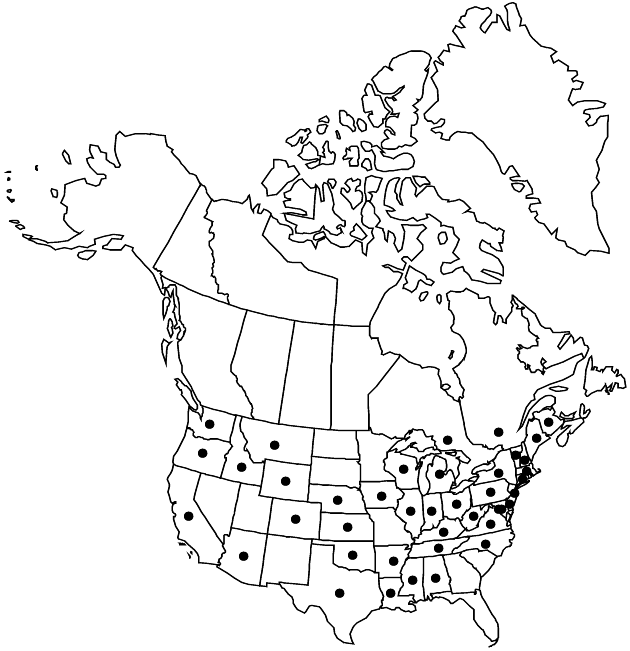Difference between revisions of "Artemisia annua"
Sp. Pl. 2: 847. 1753.
FNA>Volume Importer |
imported>Volume Importer |
||
| (3 intermediate revisions by 2 users not shown) | |||
| Line 8: | Line 8: | ||
}} | }} | ||
|common_names=Sweet Annie;sweet sagewort;armoise annuelle | |common_names=Sweet Annie;sweet sagewort;armoise annuelle | ||
| + | |special_status={{Treatment/ID/Special_status | ||
| + | |code=I | ||
| + | |label=Introduced | ||
| + | }} | ||
|basionyms= | |basionyms= | ||
|synonyms={{Treatment/ID/Synonym | |synonyms={{Treatment/ID/Synonym | ||
|name=Artemisia chamomilla | |name=Artemisia chamomilla | ||
|authority=C. Winkler | |authority=C. Winkler | ||
| + | |rank=species | ||
}} | }} | ||
|hierarchy=Asteraceae;Asteraceae tribe Anthemideae;Artemisia;Artemisia subg. Artemisia;Artemisia annua | |hierarchy=Asteraceae;Asteraceae tribe Anthemideae;Artemisia;Artemisia subg. Artemisia;Artemisia annua | ||
| Line 27: | Line 32: | ||
|elevation=0–2000 m | |elevation=0–2000 m | ||
|distribution=N.B.;Ont.;Que.;Ala.;Ariz.;Ark.;Calif.;Colo.;Conn.;Del.;D.C.;Idaho;Ill.;Ind.;Iowa;Kans.;Ky.;La.;Maine;Md.;Mass.;Mich.;Miss.;Mont.;Nebr.;N.H.;N.J.;N.Y.;N.C.;Ohio;Okla.;Oreg.;Pa.;Tenn.;Tex.;Vt.;Va.;Wash.;W.Va.;Wis.;Wyo.;Eurasia. | |distribution=N.B.;Ont.;Que.;Ala.;Ariz.;Ark.;Calif.;Colo.;Conn.;Del.;D.C.;Idaho;Ill.;Ind.;Iowa;Kans.;Ky.;La.;Maine;Md.;Mass.;Mich.;Miss.;Mont.;Nebr.;N.H.;N.J.;N.Y.;N.C.;Ohio;Okla.;Oreg.;Pa.;Tenn.;Tex.;Vt.;Va.;Wash.;W.Va.;Wis.;Wyo.;Eurasia. | ||
| + | |introduced=true | ||
|discussion=<p>Widely cultivated for aromatic oils, <i>Artemisia annua</i> often persists in gardens, becoming naturalized in moist-temperate areas (especially in eastern United States). Reports of naturalization may be exaggerated (reported for Prince Edward Island, but not established).</p><!-- | |discussion=<p>Widely cultivated for aromatic oils, <i>Artemisia annua</i> often persists in gardens, becoming naturalized in moist-temperate areas (especially in eastern United States). Reports of naturalization may be exaggerated (reported for Prince Edward Island, but not established).</p><!-- | ||
--><p>The systematic placement of this species appears to align most closely with species of the Eurasian subg. Seriphidium (L. E. Watson et al. 2002). Molecular evidence suggests that the <i>Artemisia annua</i> lineage may be ancestral to woody species in the Old World.</p> | --><p>The systematic placement of this species appears to align most closely with species of the Eurasian subg. Seriphidium (L. E. Watson et al. 2002). Molecular evidence suggests that the <i>Artemisia annua</i> lineage may be ancestral to woody species in the Old World.</p> | ||
| Line 37: | Line 43: | ||
-->{{#Taxon: | -->{{#Taxon: | ||
name=Artemisia annua | name=Artemisia annua | ||
| − | |||
|authority=Linnaeus | |authority=Linnaeus | ||
|rank=species | |rank=species | ||
| Line 52: | Line 57: | ||
|publication title=Sp. Pl. | |publication title=Sp. Pl. | ||
|publication year=1753 | |publication year=1753 | ||
| − | |special status= | + | |special status=Introduced |
| − | |source xml=https:// | + | |source xml=https://bitbucket.org/aafc-mbb/fna-data-curation/src/2e0870ddd59836b60bcf96646a41e87ea5a5943a/coarse_grained_fna_xml/V19-20-21/V19_893.xml |
|tribe=Asteraceae tribe Anthemideae | |tribe=Asteraceae tribe Anthemideae | ||
|genus=Artemisia | |genus=Artemisia | ||
Latest revision as of 20:57, 5 November 2020
Annuals, 30–200(–300) cm, sweetly aromatic. Stems mostly 1, erect, green, turning to reddish brown with age, simple (smooth or ribbed), glabrous or sparsely hairy. Leaves cauline, bright green; blades triangular to broadly ovate, 2–5(–10) × 2–4 cm, 2–3-pinnatifid (lobes relatively narrow, ± toothed), faces glabrous, gland-dotted. Heads (nodding, peduncles 2–5 mm) in open, (diffusely branched, leafy) arrays 15–30(–40) × 10–20 cm. Involucres globose, 1.5–2.5 × 1.5–2.5 mm. Phyllaries (green) lanceolate, glabrous. Florets: pistillate (0–)10–20; bisexual 18–24; corollas pale yellow (broadly campanulate), 0.5–1 mm, glabrous. Cypselae oblong (flattened), 0.3–0.8 mm, glabrous. 2n = 18.
Phenology: Flowering late summer–fall.
Habitat: Moist waste areas, sandy soils
Elevation: 0–2000 m
Distribution

Introduced; N.B., Ont., Que., Ala., Ariz., Ark., Calif., Colo., Conn., Del., D.C., Idaho, Ill., Ind., Iowa, Kans., Ky., La., Maine, Md., Mass., Mich., Miss., Mont., Nebr., N.H., N.J., N.Y., N.C., Ohio, Okla., Oreg., Pa., Tenn., Tex., Vt., Va., Wash., W.Va., Wis., Wyo., Eurasia.
Discussion
Widely cultivated for aromatic oils, Artemisia annua often persists in gardens, becoming naturalized in moist-temperate areas (especially in eastern United States). Reports of naturalization may be exaggerated (reported for Prince Edward Island, but not established).
The systematic placement of this species appears to align most closely with species of the Eurasian subg. Seriphidium (L. E. Watson et al. 2002). Molecular evidence suggests that the Artemisia annua lineage may be ancestral to woody species in the Old World.
Selected References
None.